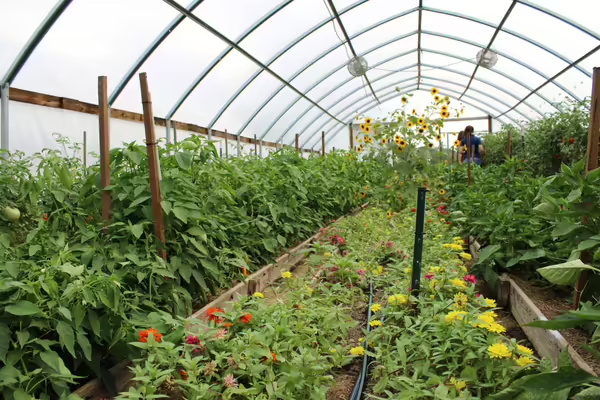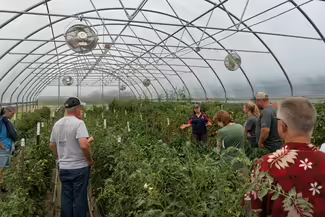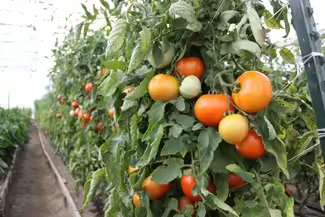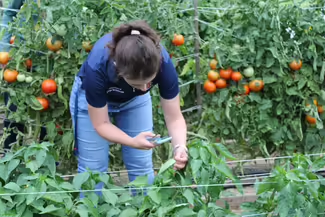
SIMPSON, Ill. — High tunnels can extend growing seasons, increase crop diversity, achieve higher yields, and improve quality, but their enclosed space can lead to higher pest pressure compared to open field production. A recent program at Dixon Springs Agricultural Center showcased current research and demonstration trials in the three commercial-sized high tunnels on site, including pest management strategies that can benefit the agricultural community and the environment.
Many growers treat infestations through chemical control but have limited options of labeled pesticides that can be used within high tunnels. The structures provide a controlled environment for ongoing research with biological controls for pest management. In addition to research conducted at the Sustainable Student Farm at Urbana-Champaign, Specialty Crops Entomologist Kacie Athey has used the Dixon Springs high tunnels as an additional test site since 2021.
When the project began, predatory insects were released into the high tunnels to act as natural enemies, feeding on harmful pests. In 2023, the research focused on a conservation biological control approach, planting cut flowers and cover crops within the structure to attract and retain natural enemies to help control pests.
“The ongoing study is monitoring a few things,” said Athey. “What does insect pressure look like in high tunnels, what predators are there, and what are they eating?”
Different management practices and growing situations can produce varying results between the two sites. The campus high tunnels do not have electricity, meaning all ventilation comes passively through the side walls. Both locations have cut flowers, which can serve as an additional source of revenue, but the flowers are planted in the center of the high tunnels at Dixon Springs and along the sides in the campus high tunnels. Current studies are determining if this makes a difference in attracting beneficial insects.
The Dixon Springs high tunnels also have cover crops that can help to increase organic matter, improve soil health, and reduce weed pressure. The limited space within the high tunnel can make it difficult to terminate cover crops, but Extension Educator Bronwyn Aly discussed how they used clear plastic to solarize instead of using mechanical termination. She also gave an update on high tunnel vegetable production practices at Dixon Springs. Tomato and pepper harvests began during the middle of June, but the last week of June saw an increase in ripe tomatoes.
“This year, I think the prolonged time with cloudy, overcast skies and temperatures below normal impacted the tomato plants in a positive manner,” said Aly. “The plants look healthy, have a uniform fruit set, and are ripening earlier than normal.”
The event was part of the Summer Twilight Series, hosted each summer month at a different farm or direct-market outlet, showcasing a range of production methods and marketing strategies throughout southern Illinois. The final program is August 18 at Wild Child Flower Farm in Sumner to explore the process, liability, and management of a U-Pick flower operation.
To learn more or register for the final program, visit go.illinois.edu/twilightseries or call 618-695-2441. If you need a reasonable accommodation to participate in any upcoming events, please contact Bronwyn Aly at baly@illinois.edu. Early requests are strongly encouraged to allow sufficient time to meet your needs.
University of Illinois Extension develops educational programs, extends knowledge, and builds partnerships to support people, communities, and their environments as part of the state's land-grant institution. Extension serves as the leading public outreach effort for University of Illinois Urbana-Champaign and the College of Agricultural, Consumer and Environmental Sciences in all 102 Illinois counties through a network of 27 multi-county units and over 700 staff statewide. Extension’s mission is responsive to eight strategic priorities — community, economy, environment, food and agriculture, health, partnerships, technology and discovery, and workforce excellence — that are served through six program areas — 4-H youth development, agriculture and agribusiness, community and economic development, family and consumer science, integrated health disparities, and natural resources, environment, and energy.


